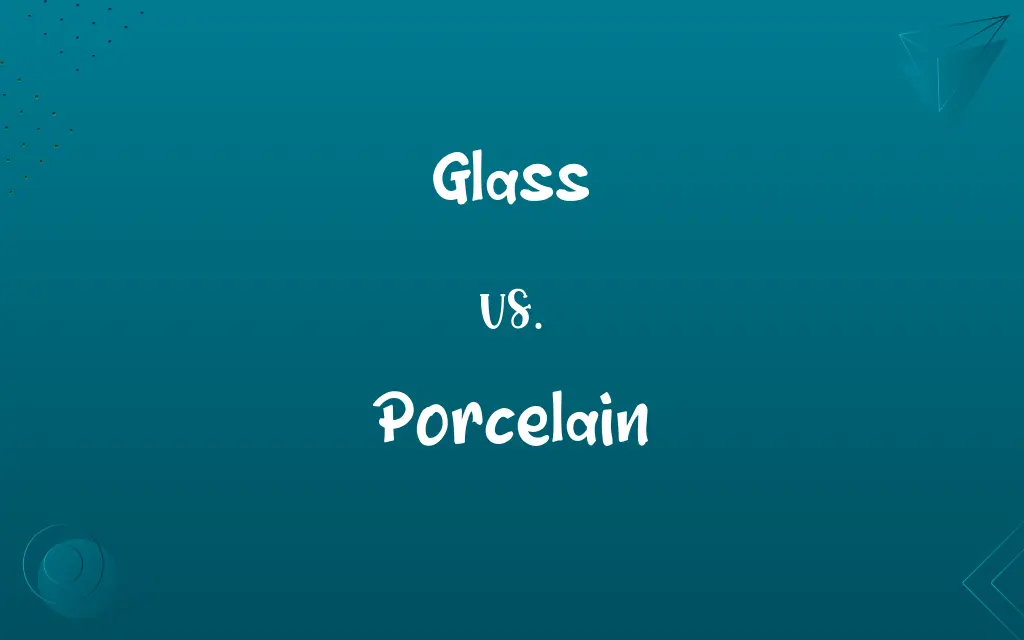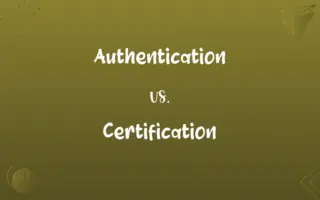Glass vs. Porcelain: Know the Difference
Glass is a hard, transparent material made by melting sand with additives. Porcelain is a white, translucent ceramic made by heating materials like kaolin in a kiln.

Key Differences
Glass is a versatile material known for its transparency and is commonly used in windows, bottles, and eyewear. It is made by melting sand with various additives at high temperatures, resulting in a range of products from delicate to toughened safety glass. In contrast, porcelain is a type of ceramic known for its strength, white translucent appearance, and smooth texture. It is made by heating materials like kaolin in a kiln to high temperatures, which results in a dense, vitrified material.
The manufacturing process of glass involves melting its components at high temperatures and then rapidly cooling them, a process known as annealing. This gives glass its characteristic smooth surface and clarity. Porcelain, on the other hand, is formed by shaping the clay-like material and then firing it in a kiln at extremely high temperatures, which causes the material to become hard and translucent.
In terms of usage, glass is widely used in both functional and decorative objects. Its ability to be formed into various shapes and sizes allows for a broad range of applications, from architectural structures to intricate glassware. Porcelain is renowned for its use in fine tableware, decorative art, and tiles. Its resistance to thermal shock and chemical erosion makes it suitable for both domestic and industrial applications.
The aesthetic qualities of glass and porcelain are distinct yet equally appealing. Glass's transparency and ability to refract light make it popular for decorative items and artistic expression. Porcelain, with its fine, smooth surface and often intricate designs, is prized in decorative arts, particularly in figurines and high-quality dinnerware.
In durability, glass varies widely based on its type; some forms are fragile and easily broken, while others, like tempered glass, are very strong. Porcelain, though harder and more chip-resistant than other ceramics, can still be brittle and is susceptible to cracking under extreme temperature changes.
ADVERTISEMENT
Comparison Chart
Material Composition
Made from sand and additives.
Made from kaolin and other materials.
Manufacturing Process
Melted at high temperatures, annealed.
Shaped and fired in a kiln at high temperatures.
Usage
Windows, bottles, eyewear, decorations.
Tableware, tiles, decorative arts.
Aesthetic Qualities
Transparent, refracts light.
White, translucent, smooth texture.
Durability
Varies from fragile to very strong.
Hard, chip-resistant but can crack.
ADVERTISEMENT
Glass and Porcelain Definitions
Glass
Objects made of glass, often used for decoration.
The shelf was adorned with colorful glass vases.
Porcelain
A white, hard, translucent ceramic made from kaolin.
The porcelain vase was a family heirloom.
Glass
Any of a large class of materials with highly variable mechanical and optical properties that solidify from the molten state without crystallization, are typically made by silicates fusing with boric oxide, aluminum oxide, or phosphorus pentoxide, are generally hard, brittle, and transparent or translucent, and are considered to be supercooled liquids rather than true solids.
Porcelain
A type of ceramic known for its strength and beauty.
The museum displayed an exquisite collection of Chinese porcelain.
Glass
A drinking vessel.
ADVERTISEMENT
Porcelain
Hard, white, translucent tableware or art pieces.
The delicate porcelain teacups were her favorite.
Glass
A mirror.
Porcelain
A hard, white, translucent ceramic made by firing a pure clay and then glazing it with variously colored fusible materials; china.
Glass
A barometer.
Porcelain
An object made of this substance.
Glass
A window or windowpane.
Porcelain
A hard white translucent ceramic, originally made by firing kaolin, quartz, and feldspar at high temperatures but now also inclusive of similar artificial materials; also often (figurative) such a material as a symbol of the fragility, elegance, etc. traditionally associated with porcelain goods.
Tableware and toilets are both made of porcelain.
Glass
The series of transparent plastic sheets that are secured vertically above the boards in many ice rinks.
Porcelain
Syn of china: porcelain tableware.
He set the table with our porcelain and stemware.
Glass
Glasses A pair of lenses mounted in a light frame, used to correct faulty vision or protect the eyes.
Porcelain
Syn of kaolin: the kind of clay traditionally used in China to manufacture porcelain.
Glass
Often glasses A binocular or field glass.
Porcelain
An object made of porcelain, (particularly) art objects or items of tableware.
The museum has an extensive collection of rare Chinese porcelains.
Glass
A device, such as a monocle or spyglass, containing a lens or lenses and used as an aid to vision.
Porcelain
Syn of cowrie.
Glass
The quantity contained by a drinking vessel; a glassful.
Porcelain
Syn of wampum: strings of shells, beads, etc. used as ornamentation or currency; the composite shells, beads, etc.
Glass
Objects made of glass; glassware.
Porcelain
A kind of pigeon with deep brown and off-white feathers.
Glass
Made or consisting of glass.
Porcelain
Purslain.
Glass
Fitted with panes of glass; glazed.
Porcelain
A fine translucent or semitransculent kind of earthenware, made first in China and Japan, but now also in Europe and America; - called also China, or China ware.
Porcelain, by being pure, is apt to break.
Glass
To enclose or encase with glass.
Porcelain
Ceramic ware made of a more or less translucent ceramic
Glass
To put into a glass container.
Porcelain
Fine tableware made from a special clay and fired at high temperatures.
They set the table with elegant porcelain dishes.
Glass
To provide with glass or glass parts.
Porcelain
A material used for making high-quality ceramics.
The artist sculpted a figure out of porcelain.
Glass
To make glassy; glaze.
Glass
To see reflected, as in a mirror.
Glass
To reflect.
Glass
To scan (a tract of land or forest, for example) with an optical instrument.
Glass
To become glassy.
Glass
To use an optical instrument, as in looking for game.
Glass
An amorphous solid, often transparent substance, usually made by melting silica sand with various additives (for most purposes, a mixture of soda, potash and lime is added).
The tabletop is made of glass.
A popular myth is that window glass is actually an extremely viscous liquid.
Glass
Any amorphous solid (one without a regular crystal lattice).
Metal glasses, unlike those based on silica, are electrically conductive, which can be either an advantage or a disadvantage, depending on the application.
Glass
(countable) A vessel from which one drinks, especially one made of glass, plastic, or similar translucent or semi-translucent material.
Fill my glass with milk, please.
Glass
(metonymically) The quantity of liquid contained in such a vessel.
There is half a glass of milk in each pound of chocolate we produce.
Glass
(uncountable) Glassware.
We collected art glass.
Glass
A mirror.
She adjusted her lipstick in the glass.
Glass
A magnifying glass or telescope.
Glass
(sport) A barrier made of solid, transparent material.
Glass
The backboard.
He caught the rebound off the glass.
Glass
(ice hockey) The clear, protective screen surrounding a hockey rink.
He fired the outlet pass off the glass.
Glass
A barometer.
Glass
Transparent or translucent.
Glass frog;
Glass shrimp;
Glass worm
Glass
(obsolete) An hourglass.
Glass
Lenses, considered collectively.
Her new camera was incompatible with her old one, so she needed to buy new glass.
Glass
A pane of glass; a window (especially of a coach or similar vehicle).
Glass
(transitive) To fit with glass; to glaze.
Glass
(transitive) To enclose in glass.
Glass
(transitive) fibreglass To fit, cover, fill, or build, with fibreglass-reinforced resin composite (fiberglass).
Glass
To strike (someone), particularly in the face, with a drinking glass with the intent of causing injury.
Glass
To bombard an area with such intensity (nuclear bomb, fusion bomb, etc) as to melt the landscape into glass.
Glass
(transitive) To view through an optical instrument such as binoculars.
Glass
(transitive) To smooth or polish (leather, etc.), by rubbing it with a glass burnisher.
Glass
To reflect; to mirror.
Glass
(transitive) To make glassy.
Glass
(intransitive) To become glassy.
Glass
A hard, brittle, translucent, and commonly transparent substance, white or colored, having a conchoidal fracture, and made by fusing together sand or silica with lime, potash, soda, or lead oxide. It is used for window panes and mirrors, for articles of table and culinary use, for lenses, and various articles of ornament.
Glass
Any substance having a peculiar glassy appearance, and a conchoidal fracture, and usually produced by fusion.
Glass
Anything made of glass.
She would not liveThe running of one glass.
Glass
A drinking vessel; a tumbler; a goblet; hence, the contents of such a vessel; especially; spirituous liquors; as, he took a glass at dinner.
Glass coaches are [allowed in English parks from which ordinary hacks are excluded], meaning by this term, which is never used in America, hired carriages that do not go on stands.
Glass
To reflect, as in a mirror; to mirror; - used reflexively.
Happy to glass themselves in such a mirror.
Where the Almighty's form glasses itself in tempests.
Glass
To case in glass.
Glass
To cover or furnish with glass; to glaze.
Glass
To smooth or polish anything, as leater, by rubbing it with a glass burnisher.
Glass
A brittle transparent solid with irregular atomic structure
Glass
A glass container for holding liquids while drinking
Glass
The quantity a glass will hold
Glass
A small refracting telescope
Glass
Amphetamine used in the form of a crystalline hydrochloride; used as a stimulant to the nervous system and as an appetite suppressant
Glass
A mirror; usually a ladies' dressing mirror
Glass
Glassware collectively;
She collected old glass
Glass
Furnish with glass;
Glass the windows
Glass
Scan (game in the forest) with binoculars
Glass
Enclose with glass;
Glass in a porch
Glass
Put in a glass container
Glass
Become glassy or take on a glass-like appearance;
Her eyes glaze over when she is bored
Glass
A hard, transparent material made from sand and additives.
The glass windows offered a clear view of the garden.
Glass
A container made of glass for holding liquids.
She poured milk into a tall glass.
Glass
A lens or set of lenses in spectacles.
His new glasses improved his vision significantly.
Glass
The material used in making windows or containers.
The artist used stained glass to create the artwork.
Repeatedly Asked Queries
Is porcelain always white?
Typically, but it can be colored or glazed.
Are glass objects always transparent?
Mostly, but they can be opaque or tinted.
How is porcelain created?
From kaolin, fired at high temperatures.
Can glass be colored?
Yes, during the manufacturing process.
Is glass recyclable?
Yes, glass is widely recyclable.
Can porcelain withstand high temperatures?
Yes, it's resistant to thermal shock.
Do glasses offer UV protection?
Some are treated for UV protection.
What makes porcelain special in tableware?
Its strength, beauty, and translucency.
How is safety glass different from regular glass?
It's tempered to be stronger and safer.
What is glass made of?
Sand and various additives.
Why is porcelain popular in art?
For its fine texture and elegance.
Is stained glass just colored glass?
It's colored and often arranged in patterns.
Is porcelain eco-friendly?
Yes, it's a natural, durable material.
Are all glass items fragile?
No, some types are very durable.
Can porcelain be repaired if chipped?
Yes, but it can be tricky.
What’s the best way to clean porcelain?
Gently, using mild detergents.
Can both glass and porcelain be used in microwaves?
Some glass can; porcelain often can.
How long does porcelain last?
Decades or more with proper care.
What’s the difference in weight between glass and porcelain?
Glass varies; porcelain is generally heavier.
What are the environmental impacts of glass production?
Energy-intensive but recyclable.
Share this page
Link for your blog / website
HTML
Link to share via messenger








































































